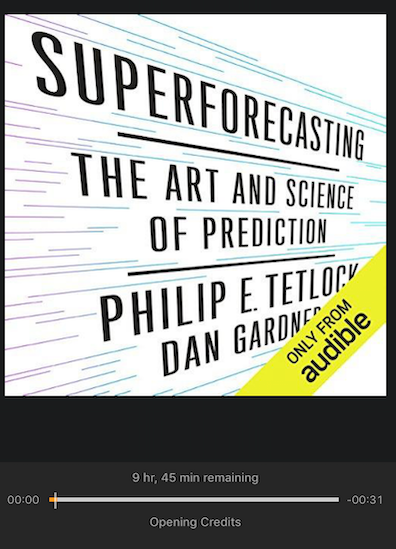Superforecasting by Philip Tetlock and Dan Gardener

After finishing the book Industries of the Future, I thought that learning more about the same topic would be a great idea. This book was different in a lot of ways and shined some light on new things for me. I know how difficult it is to anticipate things in the world, especially as God can change everything overnight. But, I wanted to learn about what people are doing successfully and what strategies are employing.
I thought that this was a very important beginning point. It’s easy to be able to apply one thing to everything but we cannot do that.
Separating the predictable from the unpredictable is difficult work, there are NO universal concepts.
I wanted to highlight this for myself so I could continue to be aware of it throughout the rest of the book. Being self-critical is something that I don’t think people always do but I believe that it is necessary for more areas of our lives than we might think.
Broadly speaking, superforecasting demands thinking that is open-minded, careful, curious, and above all, self-critical. It also demands focus.
I love this question. Too often it seems like we become overly attached to our views and conclusions. Yet, everything that we forecast or predict can be proven wrong. Things always change and even if we foresee something happening one way, it should not be surprising if something contrary to that actually occurs.
The best way to prove a hypothesis true is an experiment intended to prove it false but which fails to do so. You must be able to answer the question, “what would convince me I’m wrong?” If you can’t, it’s a sign you’ve grown too attached to your beliefs.
People much too often misinterpret things. “The evening” can mean 4 pm to one person, 5 pm to another, and 6:30 pm to another person. It’s very important to be specific and ensure that there is a consensus between multiple parties. I thought this was absurd and for something as serious as this, everyone needs to understand things in the same way. How else can effective decisions be made?
“An attack on Yugoslavia in 1951 should be considered a serious possibility,” Kent said that the odds were 65/35 in favor of an attack. A senior state official thought that meant much lower. The team thought various things, 80/20, another thought 20/80. The phrase that seemed and looked so informative seemed almost useless. Perhaps worse as it has created dangerous misunderstandings.
I see this all the time. If people do not seem totally confident about things, we are too quick to assume or conclude that they might be incompetent or uninformed.
People trust more confident financial advisors over less confident advisors even when their track records are identical. People equate confidence and competence.
This was the last point that I highlighted because I wanted to remind myself of just how important feedback is. Without feedback, we can become too clung to our perspectives or forecasts and not recognize when we actually need to change our stance. The final point that jumped out to me was again the specificity needed for everything. If we are not specific about things, we will never be able to tell if we are actually correct, and if we do end up being incorrect, it will be extremely difficult to determine why.
We need high quality feedback in order to grow and progress as forecasters. We may not get feedback because our predictions are ambiguous and make it difficult to determine accuracy.

This was a book I learned quite a bit from, definitely one I enjoyed and did like. I didn’t love it but greatly enjoyed learning the differentiation between certain terms and understanding why people present things in the ways that they do. I am now in the middle of my current book, “The Art of Thinking Clearly” by Rolf Dobelli, he talks about Philip Tetlock and this book in Chapter 40, The Forecast Illusion. I forgot that Philip’s book was based on an evaluation of 28,361 predictions from nearly 300 self-appointed professionals. That’s 100 predictions per person. And the thing is, these weren’t random predictions but rather forecasts backed up by research. Everyone was very very well informed.
I gave this book a 3.5/5